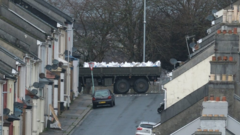8 minutes ago
About sharing
A 500kg (1,102lb) German World War Two bomb that forced the evacuation of thousands of people in Plymouth has been taken out to sea for disposal.
The unexploded device was found in a garden on St Michael Avenue on Tuesday, sparking four days of disruption.
On Friday police closed roads and rail and bus services were stopped as the bomb was transported 1.4 miles (2.3km) through the city’s streets.
The device has since been taken by boat beyond the breakwater to be detonated.
Lt Col Rob Swan, who has been leading the bomb disposal team working to make it safe, told the BBC it would be lowered into the sea to about 46ft (14m) before it is detonated.
He said it would happen “hopefully at some point this evening, or indeed tomorrow depending on the weather conditions”.
Mr Swan said it probably “wouldn’t be as Hollywood as some people would like to imagine”, but people may see “a splash” on the surface, depending on the conditions out at sea.
The disposal of the device marks the end of huge disruption for thousands of people living in Plymouth.
A temporary 300m (984ft) cordon was put in place on Friday afternoon to allow experts to transport the bomb from the Keyham area of the city in a military convoy to the Torpoint Ferry slipway.
Plymouth City Council said 10,320 people and 4,300 properties fell within the cordon.
Residents in the area were asked to leave their homes for about three hours from 14:00 GMT as a safety precaution.
A number of roads were closed and rail and bus services were stopped as the bomb was transported through the city.
The cordon was lifted shortly after 17:30.
Resident Vicky Brotherton said it had been “a very anxious time for us” and she was “very relieved” to be home after spending the past four days in a caravan in Cornwall.
“Just a massive thank you to everyone who has been involved to end this safely – really impressed with His Majesty’s forces.”
Resident Jeannette Ssentongo said she was glad the bomb had been moved.
“Every morning I was at work checking my phone,” she said. “It’s been a worry.”
Keyham resident Christine Jolley, who lives on St Aubyn Avenue, said the past few days had been “very stressful”.
“It’s been terrible – we were one of the first ones out Tuesday morning and we just left the house, we didn’t bring anything with us.
“We were allowed back in the evening to get my husband’s tablets and that’s it really.”
Plymouth City Council leader Tudor Evans thanked everyone involved in the removal of the bomb.
He said it had brought out a “war-like spirit” in the city.
“I think it is fair to say that the last few days will go down in history for Plymouth,” Mr Evans said.
“This war-time bomb has really brought out war-time spirit, people coming together to really support each other and whilst it has been really tough – we got through it.”
The council said the Life Centre leisure centre had been used as an emergency rest centre for people who had been evacuated.
Staff at The Box, a cultural space and museum in the city, believe the explosive fell during one of the heaviest nights of bombing in World War Two.
Using “bomb maps” from the war, the museum said it was dropped on 22 or 23 April, 1941. According to the museum, some 1,362 bombs exploded in the city during the war.
Follow BBC Devon on X (formerly Twitter), Facebook and Instagram. Send your story ideas to spotlight@bbc.co.uk.
Related Topics
2 days ago
9 hours ago
1 day ago
